24 Signs That You’re an INTJ, the “Strategist” Personality Type
INTJs are one of the rarest personality types in the Myers-Briggs® system, making up a mere 2.1% of the U.S. population. Famous INTJs include Ayn Rand, Isaac Newton, and Stephen Hawking. They are known for their rationality, insight, and high standards.
If you’ve gotten this type on a personality questionnaire, you might be thinking to yourself, “Is this for real? Am I REALLY an INTJ?” Well, let’s take a look at twenty-four thoughts, experiences, strengths, and even weaknesses of this type to see if you relate. Let’s get started!
Not sure what your personality type is? Take our new personality questionnaire here. Or you can take the official MBTI (Myers-Briggs Type Indicator®) here.

Estimated reading time: 9 minutes
Check out the infographic below to see some of the signs that you’re an INTJ personality type in a visual form! If you don’t relate to many of these, it’s probably a sign that you’re not an INTJ type.
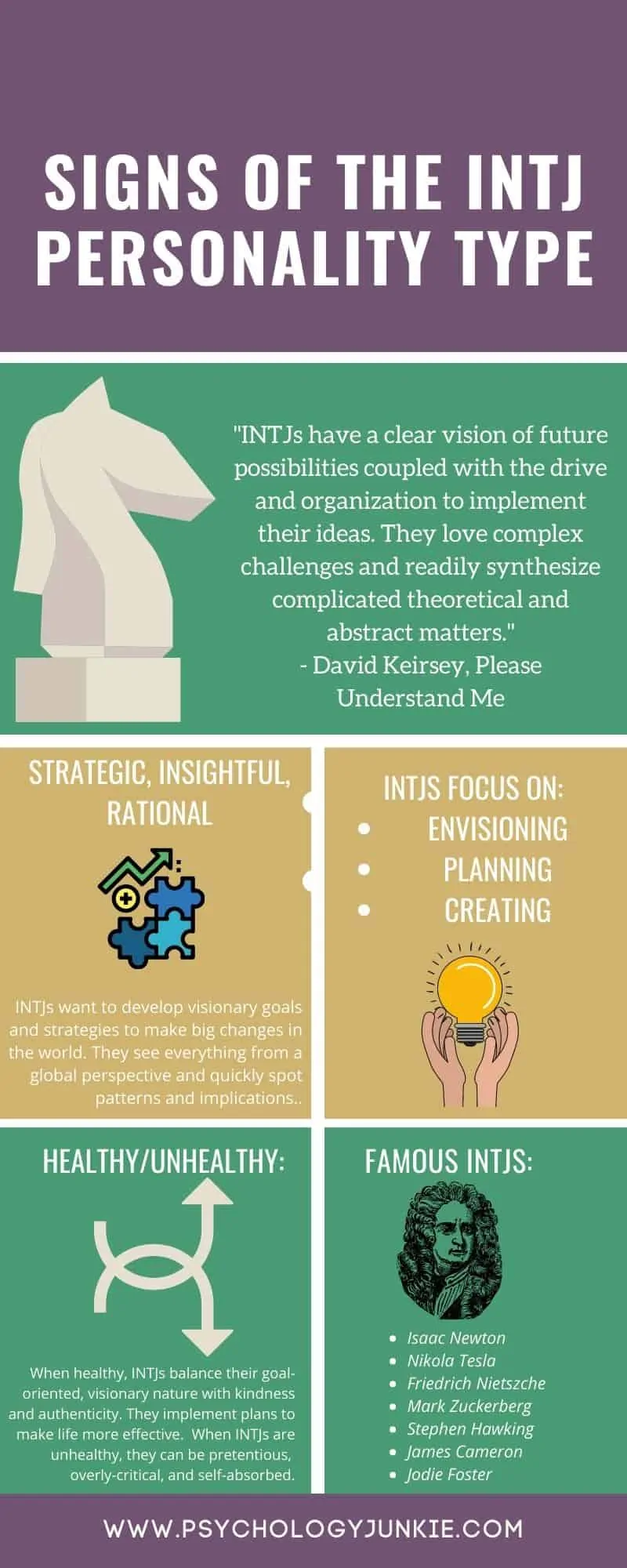
What is an INTJ?
If you’re new to type and you’re not even sure what an INTJ is, then you’re in the right place!
The INTJ is one of 16 of the Myers-Briggs personality types. Some people call the INTJ the architect or mastermind because of their ability to compose far-reaching strategies. The INTJ code stands for different preferences:
I stands for Introversion, N stands for iNtuitive, T stands for Thinking, and J stands for Judging. You can find out more about the INTJ personality type by reading this article or exploring What It Means to Be an INTJ.
Signs That You Are an INTJ:
#1 – You Look to the Future Rather Than the Past
You’re always thinking forward, imagining how something will play out or a situation will unfold. You are more interested in envisioning future possibilities than backtracking or reminiscing about past experiences. You also use a process called Extraverted Thinking that helps you to structure your life and organize systems to achieve those future-oriented goals and objectives.
#2 – You’re Skeptical of Slogans and Authority
If an idea or position makes logical sense, you’ll adopt it. You care less about who’s saying something than the truth or sensibility of what they are saying. Authority doesn’t impress you. Big names don’t mean much to you. People who pull rank will disgust you. You’re looking for logic, innovation, and vision, and you believe anyone from the janitor to the college professor might have a new brilliant idea to share.
#3 – You Adjust Reality to Your Ideas
You’re fixated on organizing the world around you so that your ideas can come to life. Reality is the malleable part of life – your ideas are the real thing to you, and they are ever evolving. You have a natural fixation on abstractions and concepts. You can aggressively go after your ideas, doing everything to make them a reality. As rumored INTJ Nikola Tesla once said, “The development of man has as its ultimate purpose in the complete mastery of mind over the material world.”
#4 – You Look For Strategies with a High Payoff
You see life as if you’re at the edge of a giant chessboard and every move counts. You look for goals and actions that will yield high payoffs and groundbreaking new discoveries.
#5 – You’re Driven to Complete Things
Once you have a vision in your mind, you will work tirelessly to achieve it. You’ll forget about meals, people, sleep, and so many other things in the pursuit of your goal. The intensity of your ambition can be a force to be reckoned with, especially for competitors.
#6 – You’re Single-Minded
Because you’re so goal-oriented, you have a hard time focusing on multiple things at once. You like to finish one thing at a time, giving your all to a project’s completion and success. You’re the most self-confident when you can push all your energy behind a single vision.
#7 – You’re a High Achiever
In school or at work, you’re driven to turn in your best work. You don’t see the point in doing anything halfway. This can make you a bit of a perfectionist. You enjoy competing with your past achievements and the achievements of others to continually grow and improve.
#8 – You Are Extremely Independent
You crave big chunks of alone time to pursue your own interests and passions. Being managed, controlled, or forced into a lot of social settings can make you feel trapped and irritable.
#9 – People Say You’re Hard to Read
Your feelings are usually internalized rather than outwardly expressed. You’re not keen on sharing feelings, no matter how intense, except with people you absolutely trust, and only when you feel a strong reason for sharing them. Because of this, people can find you mysterious and maybe a little intimidating. But, what others often fail to realize is….
#10 – You’re Hypersensitive to Feelings of Rejection or Betrayal
Just because you’re not an open book doesn’t mean you don’t feel things deeply. You have very strong values, emotions, and passions and you can feel guarded against the outer world because of how sensitive your emotions really are. Being rejected, betrayed, or having one of your values dismissed can make you feel extremely vulnerable and hurt.
#11 – You Hate Interruptions
Because you like to give your goals your entire attention, you struggle when you have to multi-task or switch gears suddenly. Interruptions are especially maddening. You may impulsively snap at someone who interrupts your thoughts mid-stream because they’ve sidetracked you from your intuition and you’re not sure if you’ll be able to find your way back to it again.
#12 – Your Best Insights Come to You Out of Nowhere
You often get sudden insights or flashes of knowing that seem to appear out of the blue. These “aha” moments are usually the result of an ongoing synthesis of data and information that your intuition has been organizing in the background of your mind. When the process of intuiting and processing is complete, you’ll suddenly get a completely packaged idea or vision that might be a catalyst for a major change in your life. You can find out more about this intuitive process in our article about introverted intuition.
#13 – When You’re Extremely Stressed, You Get Impulsive
In cases of extreme or ongoing stress, you tend to flip a switch and become impulsive, hyperactive, and maybe reckless or hedonistic. Normally methodical and controlled, this sudden change in focus can shock you as much as it shocks other people. Suddenly you might blow all your money on a cruise, drink too much, or run ten miles in the pouring rain even if you’re soaked and your feet hurt. You lose your long-range focus and your preference for slow and steady contemplation withers. During these times it’s easy to fixate purely on the present moment. You can find out more about this in my article: 12 Stress-Busting Tips for INTJs.
#14 – You Just Know About People Without Knowing Why
You often can sense how authentic someone is being or whether or not they have ulterior motives. You trust your intuitions about people, even if their words might say something to the contrary of your intuition.
#15 – You Feel Compelled to Search for Meaning
You have very little interest in surface details or fleeting pleasures. You need the things you do to have long-term meaning and significance. You look for meaning in everything around you. This tends to give you an interest in philosophy, psychology, and even spirituality.
#16 – You Tend to Forget People’s Names
You’re more interested in remembering people’s ideas than you are in remembering their names or random facts about their lives. Frustratingly, you perpetually forget people’s names, birthdates, or other factual details about them that they might see as important.
#17 – You Often Feel Like the Only One Who Sees the True Reality
Like the child in “The Emperor’s New Clothes,” you are often able to see things that others are blind to. This is especially true when it comes to underlying motives and hidden agendas. You might immediately notice that someone is a fraud, liar, or manipulator while others are being pulled in by their charms.
#18 – You’re Rarely Surprised
Because you’re so focused on anticipating future implications, it’s hard for anyone to surprise you. Picking up hidden clues is second nature to you and something you’re competent in. Noticing patterns and trends is something you’ve been doing since you were a young child. This can be disappointing to friends and family members who want to get a reaction out of you!
#19 – Routine Smothers Your Creativity
You hate knowing that every single day is going to be exactly the same. You especially despise focusing on rote, mundane tasks. Things like washing the dishes multiple times a day, proofreading form letters, or having the same set of tasks every day can drain the inspiration out of you. You crave a life where you can follow your inspiration, trailblaze new paths, and be creative.
#20 – You Know How to be Tough and Decisive When Others Can’t
In chaotic situations, many people feel panicky or they get sidetracked by their emotions. You are good at sifting out distractions, directing people, and making a quick decision. You realize that sometimes a fast decision is better than a perfect one.
#21 – You Struggle to Give As Much Praise and Affirmation as Others Desire
Unless you’re at a very high level of maturity, it can be hard for you to give people the kind of verbal affirmation they’re looking for. You tend to express your feelings through action rather than words. Being effusive, complimentary, and congenial tends to feel phony or uncomfortable for you.
#22 – You Have a Romantic Side
While it may seem nonexistent from an outside perspective, you really do have a very passionate romantic side. During times of solitude and reflection, you often enjoy reading poetry, listening to romantic music, analyzing your emotions and feelings for others, or even watching romantic movies (as long as they’re profound in some way).
#23 – Sensory Stimulation Is Often Overwhelming
Because Extraverted Sensation is your inferior function, you often find a lot of commotion, bright lights, or noise distressing. You often dim the lights when you enter a room, turn down music, or feel like you have to get away when there is too much sensory overload. It often feels like sensory commotion makes it impossible to think clearly or access your intuition as well as you’d like to.
#24 – You Crave Competence and Self Control
You want to be ingenious and competent at whatever you set your mind to doing. You also want to have control and power over your reactions and your own course in life. Solving complex problems can rev your mental engine and get you into a state of flow. But losing control, emotionally, financially, or in any other way makes you feel vulnerable, incompetent, and overwhelmed.
What Are Your Thoughts?
Did you enjoy this article? Do you have any insights or thoughts to share? Let us know in the comments!
Find out more about your personality type in our eBooks, The INTJ – Understanding the Strategist, Discovering You: Unlocking the Power of Personality Type, The INFJ – Understanding the Mystic, and The INFP – Understanding the Dreamer. You can also connect with me via Facebook, Instagram, or Twitter!
Other Articles You Might Enjoy:
The Underrated Kindness of the INTJ Personality Type
10 Things That Excite the INTJ Personality Type
The Childhood Struggles of INTJs
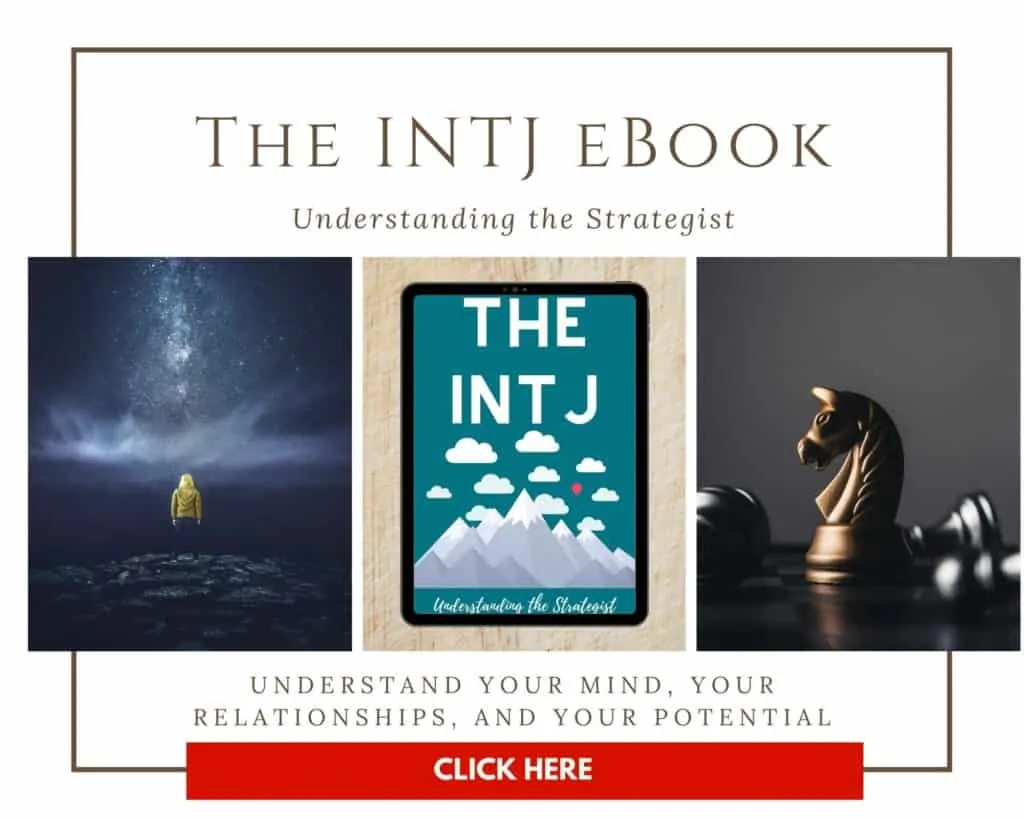

Subscribe to Our Newsletter

Want to discover more about personality type? Get the inside scoop with Susan Storm on all things typological, along with special subscriber freebies, and discounts on new eBooks and courses! Join our newsletter today!




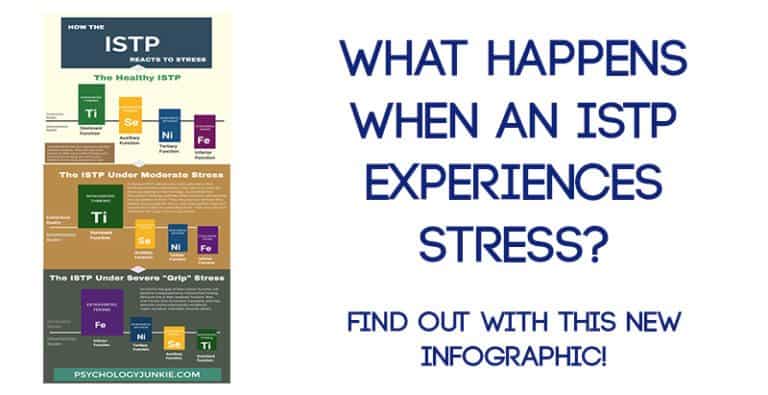
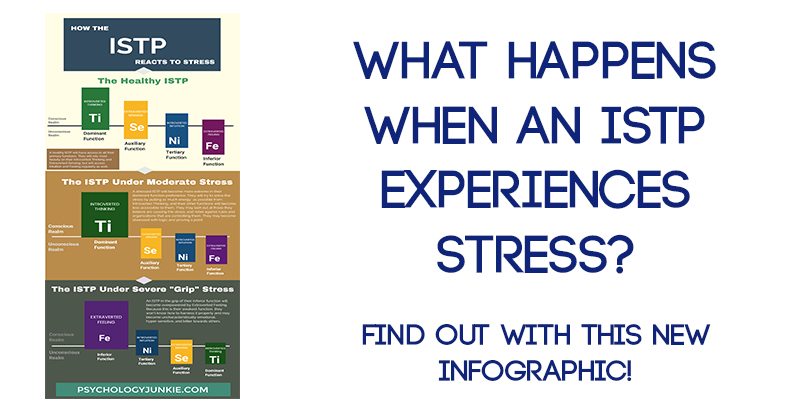




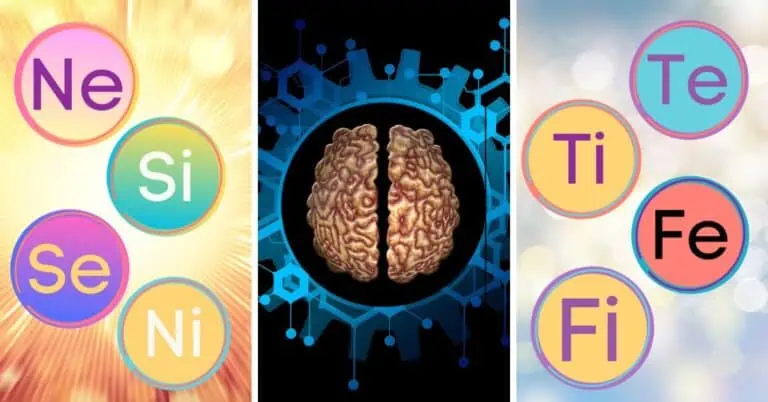
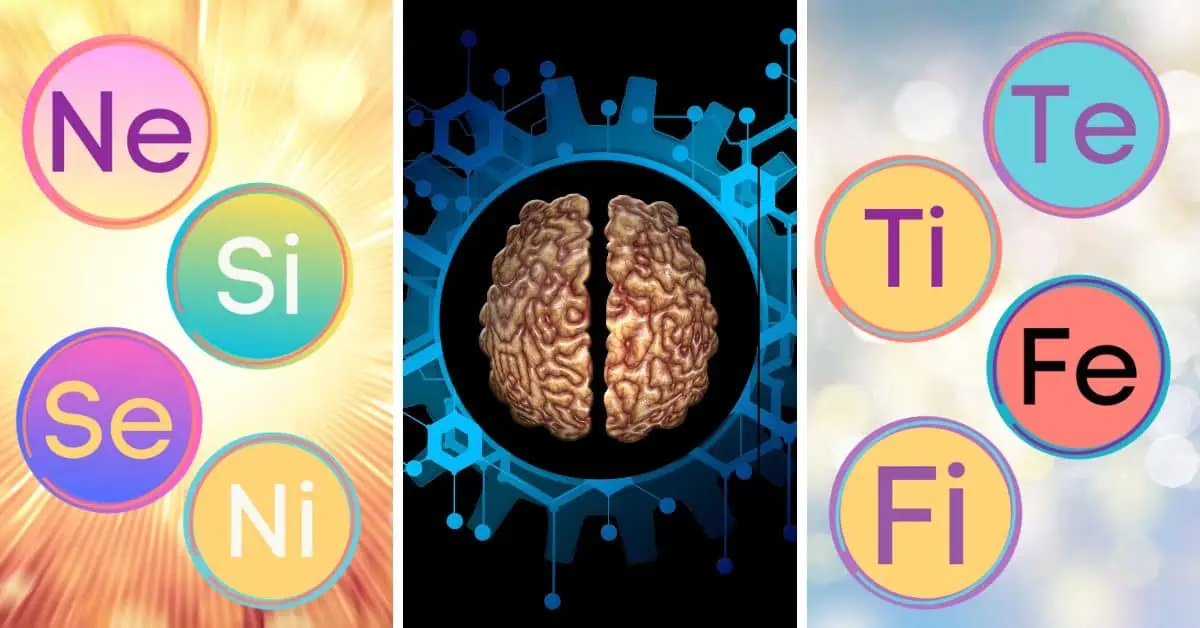

This is a great roll up. All the above is absolutely me. Thank you for helping me understand myself better!
99% spot on for me; #16, however is only mostly true in my case. I have a thing for numbers and can remember birthdates of kids I went to school with 45 yrs ago.
I really like this article. I’m a young, 21 year old, INTJ, that struggles with daily tasks and keeping friendships. I’m a very dedicated and focused person with my future goals, and sometimes wish I was that way with people too. Maybe, one day, I’ll be able to open myself up to more opportunities for relationships outside of work or school.
Me and you both Ashton
Great read. I’m an INFP engaged to an INTJ. This list is spot on.
Finally enlightens me. Since I’m confused if I’m truly an INTJ person.
Surprisingly, I’m 100%. Good to know.
Hits the point
I have taken the test many times and always seem to either get the result that I am an INFJ or INTJ. I seem to be a mix of both. I think INFJ is more of who I used to be and INTJ is more of who I am becoming. #13, 14, 19, 23, and 24, all definitely fit me completely. When I get stressed I get impulsive I have a hard sticking to a routine, I crave something more than the mundane. I am great at reading people, often told by others that I read their mind. I often feel overwhelmed and overstimulated, my room I retreat to is often dark, music quiet, I need to escape the noise of the world. I also do not like to feel like I am losing self control ever, part of why I do not have an addictive personality as I like to be able to function properly at all times and do not like being vulnerable to others control.
Thank you for helping strengthen my knowledge that I am not insane. I have been trying to explain my “3 constant, simultaneous, independent levels of thought” for years. I was in my teens when I first truly made a note of it. Though I have tried, for several decades now, I still can’t quite articulate it.
The end result is #12.
Definitely an INTJ spot on. I took the test long time and still convinced. I hate that I struggle to communicate properly, words seen not to come out the way I want and not being understood but am getting bette
r as I progress. Reading peoples mind surprises me but am confident as ever.
Prepare the Way, the MESSIAH is coming!
I was introduced to the MBTI nearly 40 years ago, as part of a team building exercise at work. While other team members downplayed its validity, I was amazed at how it accurately described me. Yet, being a performance auditor, I needed corroborative evidence and compared it with the results of my handwriting analysis. I was astonished to find a nearly 100%, perfect match.
Years later, I ran accross this quote, which helped to explain this finding: “The pen is the tongue of the mind.”
As parents, our job is to find our child’s natural gifts as soon as possible. Through their actions and words, our children disclose heaven’s gifts which parents lovingly develop.
Yes, 40 years have passed since this INTJ was introduced to the MBTI. This helped me to read about and understand the other 15 types, with the understanding, “I’m okay. You’re okay.” 😀